Returning amid the country’s dual crises of the COVID-19 pandemic and the equally deadly malady of institutionalized racism is a series that’s more timely than ever before: the critically acclaimed and award-winning Black On Both Sides, which recently premiered the first 5 episodes (out of 8) of its second season on Seeka TV. The final 3 episodes of Black On Both Sides’ second season will air soon (date to be announced).
Tackling such urgent issues as the continuing spate of police brutality in America, the impact of such violence on communities of color, and the balancing act that Black Americans are forced to perform in professional settings to please their White superiors (also known as “code switching”), Black On Both Sides is quite possibly the most important and most relevant episodic series airing on any platform today.
Created by and co-starring Alonge Hawes (Blue Collar Hustle), and co-executive produced by Hawes and Seeka TV CEO/co-founder George Reese, season 2 of Black On Both Sides explores the challenges that face Black Americans in society through the suspenseful yet realistic story of young professionals whose struggles in the White-dominated consumer retail business force them to take desperate actions as they attempt to secure better futures for themselves and their loved ones.
In season 1 of Black On Both Sides, Anansi Moor (Hawes) and his co-workers at a supposedly thriving wireless phone company – Henry Gil Scott-Heron (Julian Robinson), Maya Patterson (Kiara Woods), and Anansi’s cousin Nandi Chisholm (played by Anange’s sister Shani Hawes) – begin a campaign of financial deception that inflates the success of their store and the productivity of Anansi’s charges.
 All this happens as Anansi does his best to get in the good graces of the company’s higher-ups, especially his boss (Cyrus Alexander, played by Scott Piehler), whose personal connection to Anansi dates back to a fateful incident that motivates Anansi’s personal quest for revenge.
All this happens as Anansi does his best to get in the good graces of the company’s higher-ups, especially his boss (Cyrus Alexander, played by Scott Piehler), whose personal connection to Anansi dates back to a fateful incident that motivates Anansi’s personal quest for revenge.
Entering season 2 of Black On Both Sides, Anansi, Henry, Maya and Nandi’s actions come under harsh scrutiny by Cyrus and their superiors. At the same time, Anansi’s emerging visibility as a campaigner for social justice following the murder of an unarmed Black man by a White cop brings increased attention to both himself, his company, and eventually, to the illegal actions undertaken by himself and his co-workers.
While the nationwide drive for police reform spurred by the Black Lives Matter movement was a strong motivator for Hawes and his team as filming began on season 2 of the series, Hawes – who’s witnessed racism in its many ugly facets in real life – says that the deaths of countless Black citizens at the hands of militant police officers necessitated the creation of a series that, in a perfect world, shouldn’t be needed. Yet as long as racism afflicts the United States of America, though, Hawes believes that Black On Both Sides is needed now more than ever.
Chris Hadley: Black On Both Sides has not only won critical acclaim and awards, but it has taken on greater importance because of the continuing police-perpetrated violence against unarmed Black Americans, and the ongoing protests against such violence. Discuss how the series is addressing both of those critical issues through the storyline and characters presented in season 2.
Alonge Hawes (star/creator/co-executive producer, Black On Both Sides): The problem, and honestly what makes me angry, is that Black On Both Sides is too relevant to modern day. Black On Both Sides season 1 was really born from the trauma of seeing so many black men and women accosted by the police and murdered (Philando Castille, Tamir Rice, Sandra Bland, Terence Crutcher) and how that trauma might affect ordinary, everyday black people to retaliate in their own way.
Season 2 was born of the trauma of the Botham Jean murder. (Jean was) a man minding his own business in the privacy of his own home when he was murdered by a police officer (in Dallas, Texas). The fact that we’re now dealing with ever more progressive and escalated acts of lynching (Ahmaud Arbery, Breona Taylor, George Floyd, Elijah Mcclain) is simply horrifying. The fact that most of season 2 was conceptualized and written before some of these murders took place doesn’t bring me any amount of great validation. It’s really just sickening.
CH: What are some of the other major issues that Black On Both Sides examines in its second season, and how is your show helping people – especially White Americans – to better understand the problems that continue to affect Black Americans today?
AH: Season 2 of Black On Both Sides examines the psyche of a Black populace who’ve had enough. There is only so much systemic trauma that a group of people can experience before the pipelines burst. Season 2 is showing the pipelines slowly bursting for this group of protagonists.
I’m really trying to put across how I feel the sense of dread that comes with simply having Black skin manifests itself. For White Americans specifically, honestly, I don’t know. There’s been over 300 years of education regarding race relations for White America, so those that “get it” will understand and those that don’t just won’t. It’s that cut and dry.

BLACK ON BOTH SIDES star, creator and co-executive producer Alonge Hawes.
CH: Talk about how the subjects that Black On Both Sides examines across both of its seasons have impacted you personally, and how your experiences influenced the dramatic arcs of the series.
AH: Creating the show in a lot of ways has been very therapeutic. I can put some of my anger and frustrations in a script, act it out, and feel a little relieved that I was able to have an outlet for those feelings. A lot of my own experiences working in a retail-based organization have been utilized in inspiring some of the direct dialogue regarding how we as Black people act within the work space.
I’ve been in many situations where white people have felt comfortable enough to tell me that I don’t “act black” because I speak a certain way, that I’m a “credit” to my race, (and) that they wish “the rest” of us to could just get over slavery and work hard. (They’re) not understanding that the only thing separating me from the “the rest” of my Black co-workers is that I’m in the game to get more of us in the door. Those of us who refuse to play that game and stay real to themselves are the real heroes.
CH: In what ways did those stories impact not just the storylines you conceived for season 2 of Black On Both Sides, but also the production process for the show?
AH: The production crew for Black On Both Sides is 100% Black; Black cinematographer (Asante Watkins), Black sound editor (Justin Lovett), Black producers (Cordarol Sanders, Rodderick Fedd, Shani Hawes, Jamal McClendon). They are the ones who help me handle the day to day aspects of principal photography and post-photography. I’m trying my best to give Black creatives a springboard for their talents.
CH: Of course, the COVID-19 pandemic has also impacted the filmmaking industry and its pace of production. How was Black On Both Sides affected by it, and what did you and your team do to adjust to the safety guidelines necessitated by this pandemic?
AH: To be completely honest, COVID-19 really put a damper on my year creatively. We had to shut down production for three months, which was precious time – especially for an independent filmmaker. There was a moment where I was in despair because not only is the momentum you’ve been building for the past three years now put on hold, people are suffering and dying of this terrible disease, and there were all these conflicting reports of how bad it was in the beginning so nobody really knew how to proceed.
I was in constant communication with my cast and crew and once we had some actual guidelines put in place, I was able to set up things so that we could return to production whilst being as safe as possible. Of course, masks were mandatory between takes, and we made sure to have hand sanitizer on hand for everyone. Probably the wildest story is (when) one weekend we were set to film at a hotel room, I arrived an hour and a half early to sanitize the room myself before the cast arrived. The entire room smelled like bleach and Lysol while we were filming!
 CH: What was the production process like for this season of Black On Both Sides, and how did it improve from season 1 to season 2?
CH: What was the production process like for this season of Black On Both Sides, and how did it improve from season 1 to season 2?
AH: My team and I have been working together for the better part of 3 years. So at this point it’s like we are a well-oiled machine.
If COVID hadn’t been a factor, we would actually have had the time to film two series: the second season of Black On Both Sides and a new series that I am working on for the platform Jaro Media. That was the plan originally; to shoot back-to-back. But because of the time lost due to COVID-19, I had to prioritize Black On Both Sides since we had a release date firmly set.
CH: Now that Black On Both Sides has exclusively partnered with web series streaming platform Seeka TV, whose CEO George Reese is also a producer on the show, how has this partnership benefited not only Black On Both Sides but also your career as an actor and filmmaker, and those of your cast and crew?
AH: Seeka TV was the first major platform to believe in me as a creative and take a chance. People don’t know, but Seeka TV picked up my first series, Blue Collar Hustle, when we only had three episodes completed. They literally took us from YouTube to their platform with only three episodes to judge upon.
Blue Collar Hustle was my first time writing scripts, acting, producing, really anything; and Seeka took that chance, and not only that, they made Blue Collar Hustle a major part of their advertising and marketing initiative. So the trust they had in my vision early on was a great confidence builder. When I pitched Black On Both Sides to George, it basically only took about three months to get a green light, which in this business is phenomenal. I love Seeka, I love what they stand for, and I hope to keep working with them on future endeavors.
CH: As you mentioned, you recently signed a development deal with Jaro Media, whom you’ll be working with on another web series you’ll be writing and producing. Are there any details you can share with us about that project, and if so, how far along is it in the development phase?
AH: This was the series I was supposed to be filming alongside Black On Both Sides this year. Unfortunately, because of COVID-19, we weren’t able to realize that goal. But the series will definitely be premiering in 2021. I can’t give specifics, but Richard DeVaughn, who runs Jaro, has an amazing Black-owned platform that not only encompasses film and digital series, but also books, podcasts, and news.
His platform is what I feel entertainment platforms of the very near future will look like. The series I’m working on is something completely different than anything I’ve done before. I like to seek new creative challenges and this one really excites me! More info will be coming towards the top of the new year.
 CH: Are there any further seasons planned for Black On Both Sides, and if so, what plans do you have to continue the series?
CH: Are there any further seasons planned for Black On Both Sides, and if so, what plans do you have to continue the series?
AH: Everything that has a beginning has an end. I believe that season 2 will sufficiently conclude Anansi’s story. I am not one who likes to extend the life of a project simply because it has been successful. As an independent filmmaker, I am very well aware that my shelf life can be very long or abruptly cut short. Funding issues are always something that keeps me up at night, even with the success I’ve had.
So I find it necessary to be able to at least say that I took every opportunity to prove my versatility by putting out a multitude of quality projects while my time is now. I am blessed to say that in three years I’ve written 32 scripts and all 32 of them have been produced. That’s more than a lot of independent creatives get to produce in a lifetime and I am so grateful. I am also excited to show the audience what I have for them next!
CH: Finally, given this incredibly difficult time we’re all living through, and the urgency of both the social justice issues America is confronting and the importance of this year’s election, what do you hope viewers of Black On Both Sides take away from seeing the show and its depiction of the real life problems that affect today’s society?
AH: I hope that people are affected to the point where they actually want to do something to make real change. Black On Both Sides shouldn’t have to exist. I should be making the next Star Wars, the next Game Of Thrones, the next black James Bond or something stylish and fun. But I have a responsibility as a Black creative to tell the truth, and the truth right now isn’t escapism and fun. The truth is raw, it’s ugly, it’s painful, and it needs to be told. At the end of the day I am a black man in America; and that story cannot be buried.
NOTE: Both seasons of Black On Both Sides are closed-captioned.
Watch Black On Both Sides exclusively on Seeka TV:

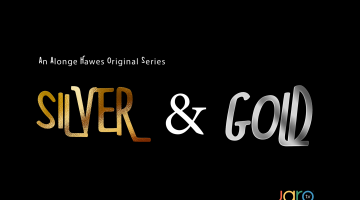



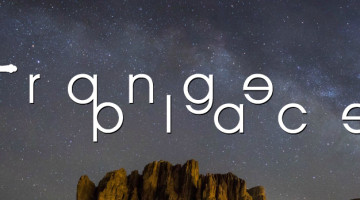
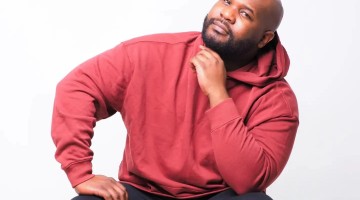
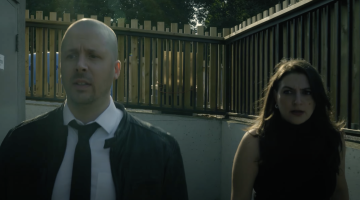
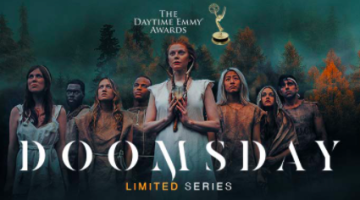

No Comment